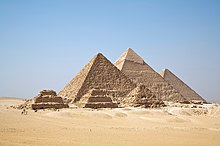ܢܘܪܢܝܐ
Appearance
Assyrian Neo-Aramaic
[edit]
Etymology
[edit]From ܢܘܼܪܵܐ (nūrā, “fire”) + -ܢܝܐ (-nāyā, the intensive attributive adjective ending). Learned borrowing from Classical Syriac, calque of Ancient Greek πῡρᾰμῐ́ς (pūrămĭ́s) based of the popular folk etymology of it being derived of πῦρ (pûr, “fire”).
Pronunciation
[edit]Adjective
[edit]ܢܘܼܪܵܢܵܝܵܐ • (nūrānāyā) (feminine ܢܘܼܪܵܢܵܝܬܵܐ (nūrānāytā), plural ܢܘܼܪ̈ܵܢܵܝܹܐ (nūrānāyē))
Noun
[edit]ܢܘܼܪܵܢܵܝܵܐ • (nūrānāyā) m sg (plural ܢܘܼܪ̈ܵܢܵܝܹܐ (nūrānāyē))
- (architecture, Egyptology) pyramid (ancient massive construction)
- ܢܘܼܪ̈ܵܢܵܝܹܐ ܪ̈ܲܒܹܐ ܕܓܝܼܙܵܐ ܦܝܼܫܹ̈ܐ ܝܗ݇ܘܵܘ ܒܸܢܝܹ̈ܐ ܐܲܝܟ݂ ܩܲܒ݂ܪܹ̈ܐ ܓܵܘ ܡܸܨܪܹܝܢ ܥܲܬܝܼܩܬܵܐ.
- nūrānāyē rabbē d-gīzā pīšē ìwā binyē ayḵ qaḇrē gāw miṣrēn ˁatīqtā.
- The Great Pyramids of Giza were built as tombs in Ancient Egypt.
- (geometry) pyramid (solid with triangular lateral faces and a polygonal base)
- (management, psychology) pyramid, hierarchy
- Synonym: ܬܸܓ݂ܡܵܐ (tiḡmā)
Inflection
[edit]| isolated forms | with possessive pronouns | |||||||
|---|---|---|---|---|---|---|---|---|
| state | form | person | singular | plural | ||||
| m | f | |||||||
| singular | absolute | – | 1st person | ܢܘܼܪܵܢܵܝܝܼ (nūrānāyī) | ܢܘܼܪܵܢܵܝܲܢ (nūrānāyan) | |||
| construct | ܢܘܼܪܵܢܵܝ (nūrānāy) | 2nd person | ܢܘܼܪܵܢܵܝܘܼܟ݂ (nūrānāyūḵ) | ܢܘܼܪܵܢܵܝܵܟ݂ܝ (nūrānāyāḵ) | ܢܘܼܪܵܢܵܝܵܘܟ݂ܘܿܢ (nūrānāyāwḵōn) | |||
| emphatic | ܢܘܼܪܵܢܵܝܵܐ (nūrānāyā) | 3rd person | ܢܘܼܪܵܢܵܝܹܗ (nūrānāyēh) | ܢܘܼܪܵܢܵܝܵܗ̇ (nūrānāyāh) | ܢܘܼܪܵܢܵܝܗܘܿܢ (nūrānāyhōn) | |||
| plural | absolute | – | 1st person | ܢܘܼܪ̈ܵܢܵܝܝܼ (nūrānāyī) | ܢܘܼܪ̈ܵܢܵܝܲܢ (nūrānāyan) | |||
| construct | ܢܘܼܪ̈ܵܢܵܝܲܝ (nūrānāyay) | 2nd person | ܢܘܼܪ̈ܵܢܵܝܘܼܟ݂ (nūrānāyūḵ) | ܢܘܼܪ̈ܵܢܵܝܵܟ݂ܝ (nūrānāyāḵ) | ܢܘܼܪ̈ܵܢܵܝܵܘܟ݂ܘܿܢ (nūrānāyāwḵōn) | |||
| emphatic | ܢܘܼܪ̈ܵܢܵܝܹܐ (nūrānāyē) | 3rd person | ܢܘܼܪ̈ܵܢܵܝܘܼܗܝ (nūrānāyūh) | ܢܘܼܪ̈ܵܢܵܝܘܿܗ̇ (nūrānāyōh) | ܢܘܼܪ̈ܵܢܵܝܗܘܿܢ (nūrānāyhōn) | |||
Categories:
- Assyrian Neo-Aramaic terms belonging to the root ܢ ܘ ܪ
- Assyrian Neo-Aramaic terms suffixed with -ܢܝܐ
- Assyrian Neo-Aramaic terms borrowed from Classical Syriac
- Assyrian Neo-Aramaic learned borrowings from Classical Syriac
- Assyrian Neo-Aramaic terms derived from Classical Syriac
- Assyrian Neo-Aramaic terms with IPA pronunciation
- Assyrian Neo-Aramaic lemmas
- Assyrian Neo-Aramaic adjectives
- Assyrian Neo-Aramaic nouns
- Assyrian Neo-Aramaic masculine nouns
- aii:Architecture
- aii:Ancient Egypt
- Assyrian Neo-Aramaic terms with usage examples
- aii:Geometry
- aii:Management
- aii:Psychology
- aii:Shapes
- aii:Pyramids
